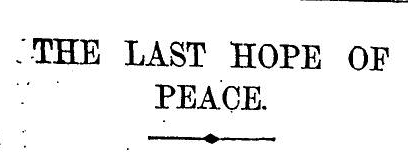We are developing the social individualist meta-context for the future. From the very serious to the extremely frivolous... lets see what is on the mind of the Samizdata people.
Samizdata, derived from Samizdat /n. - a system of clandestine publication of banned literature in the USSR [Russ.,= self-publishing house]
|
The last hope of peace  The Times 20 June 1914 p8 Now you might think that a headline like that (from 20 June 1914) would be prescient. But no. They are not referring to the prospect of a world war but to the prospect of civil war in Ireland.
It is an issue that has been dominating the pages of The Times for the last two years. In that time the debate had not moved on an inch. It can’t because the aims of nationalists and unionists are fundamentally incompatible.
For our ancestors the prospect of a world war exists but there are no obvious crises at the moment and anyway all those that have threatened to blow up have been diffused pretty quickly.
|
Who Are We? The Samizdata people are a bunch of sinister and heavily armed globalist illuminati who seek to infect the entire world with the values of personal liberty and several property. Amongst our many crimes is a sense of humour and the intermittent use of British spelling.
We are also a varied group made up of social individualists, classical liberals, whigs, libertarians, extropians, futurists, ‘Porcupines’, Karl Popper fetishists, recovering neo-conservatives, crazed Ayn Rand worshipers, over-caffeinated Virginia Postrel devotees, witty Frédéric Bastiat wannabes, cypherpunks, minarchists, kritarchists and wild-eyed anarcho-capitalists from Britain, North America, Australia and Europe.
|





Good post.
If only there had been nuclear weapons in 1914.
The prospect of being vaporised rather than sending others to die in the mud might have concentrated the minds of the assorted royals and aristocratic politicians who made such a pig’s ear of things back then.
There were gigantic rallies in favour of war in the Summer of 1914 as the crisis unfolded. The elites may have fucked up in a massive way but this was not the case of such elites driving an unwilling herd to war – far from it.
Pete, that reminds me of a novel I read when I was a teenager. “Anti-Ice” by Stephen Baxter. Its basic focus is what would have happened if the nuclear age had arrived 100 years early because of the discovery of a material with enormous capacity for energy release (the titular Anti-Ice). The conclusion of the book was something like the beginning of the cold war, but with the UK being the dominant power rather than the USA.
I think the idea is that ultimate-weapon deterrence always ends up in more or less the same place.
The Irish Question. In the Victorian SF role-play setting “Space: 1889” one of the stock villain groups is Irish Republicans. It’s one of those defining issues it seems, in the idea of the era from roughly 1870 until 1914.
I can’t understand the Irish mania for running out the British government and all, but then as a Yank, it is not exactly my business!
From JV: I think the idea is that ultimate-weapon deterrence always ends up in more or less the same place.
..”
Only if you can count on the rationality of your potential opponents. Ultimately, the Soviet Union wasn’t interested in mutual suicide. There are regimes out there now for whom this would be a feature, not a bug.
As was explained in an episode of Doc Who a few seasons back, the Irish had often plotted to kill Queen Victoria. It was lucky for Ireland that they didn’t succeed, or Britain would have felt duty-bound to hang onto all of Ireland forever, and not give them a win.
A reference, I think, to the Third Home Rule Bill, the battle over which occupied much of Parliament’s time from its original proposal in 1912. The disputes were principally over the opposition in Ulster to anything that weakened the Union. It did actually receive the Royal Assent in September of 1914 but never went into effect, as the war, the Easter Rising and the Irish War of Independence ultimately rendered it moot.